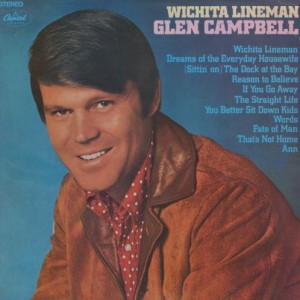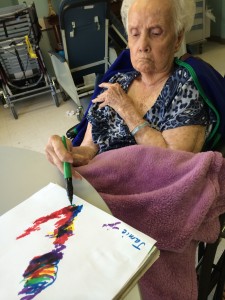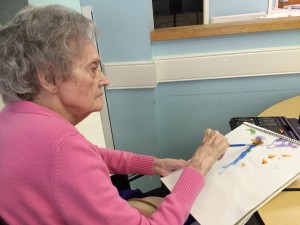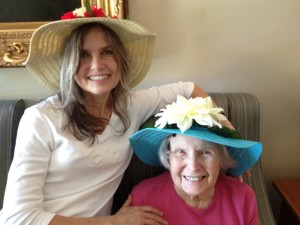
The documentary, “I’ll Be Me” hit home many times as the tears welled up from the deep places I’ve hidden my grief. I could see or hear others in the almost filled auditorium that were experiencing similar feelings. Watching the story of Glen Campbell’s final tour as his dementia progressed was bittersweet. His life’s musical achievements are such a dominant thread in his life that those creative elements remain strong even as words and memories become distant. His ability to sing, read, and play the guitar gave me hope for continued sharing and connecting with the many I know with AD. Mr. Campbell said, “I’m still here but yet I’m gone.” His daughter, Ashley, says in the documentary, “Daddy, don’t you worry, I’ll do the remembering.” Mr. Campbell is fortunate to have close family relationships that know his story so well and can tap into that creative place to draw out communication as his dementia progresses.
Likewise, the artist, Hilgos, is featured in a collection of stories entitled, “I Remember Better When I Paint,” which tells the remarkable uncovering of her intact ability to paint and communicate through her art even after she was deemed “void and with no mind” by nursing home staff and doctors. This effort, inspired by her daughter who responded to her mother’s remark, “I remember better when I paint” hired an art student to prompt this retired artist to once again pick up a brush.
Although this positive response took several months of consistent presence on the part of the student, once the breakthrough came, the communication began. Following 91-year old Hilda’s lead, a memorable relationship developed that changed the course of both their lives. Hilda Gorenstein (Hilgos) returned to creating more works of art to be displayed and appreciated. Although Mrs. Gorenstein is now gone, that young art student, Jenny Graf Sheppard, continues to speak about and research the value of the arts with Alzheimer patients.
Dr. Gene Cohen writes “All of us have certain skills or interests that we have more highly developed than others- usually an area where we have, in some manner, been creatively engaged. The challenge is to help affected individuals find those areas and have an opportunity to tap them. The result is a quality of life that is increased by the satisfaction of being able to use that residual capacity.”1
Indeed, that is the challenge. Not all folks have the obvious talent that Glen Campbell has with his music and Hilgos had with her paintings. It is the mystery to be solved. Often, the duty is left to activity directors or private sitters who have little knowledge of the history of that individual. I am faced with that challenge on a daily basis with my mother and others whom I see whose mysteries remains unsolved.


I hope that Mr. Campbell’s caregivers sing to him those familiar songs that are hidden where memories never die – in that creative place that brings joy and beauty to those who see and hear. I am reminded what is written in Isaiah 61:3-4 “To appoint unto them that mourn in Zion, to give unto them beauty for ashes, the oil of joy for mourning, the garment of praise for the spirit of heaviness; that they might be called trees of righteousness, the planting of the Lord, that he might be glorified. KJV”.
When the creative is tapped, life is brought forth. Instead of the blank, “nothing is there” diagnosis, beauty is uncovered and rises from the ashes. Joy comes from that discovery, however brief, and thanks are given for the moment shared.
May we become more sensitive to the remaining qualities of those living with AD, recognize what they are and be sure to tap into that wellspring of life that remains.
Creating awareness of Alzheimer’s disease and offering emotional support is a goal of the Volunteers of America and of the Mobile Museum of Art “Keepsake” Program. Both recognize the growing need in our community and the coming tsunami of diagnosed cases that we are not prepared for.
To learn more about the Campbell’s effort to create awareness, go to glencampbellmovie.com.
To learn more about Hilda’s Gorenstein’s story, go to www.hilgos.org
1Cohen, Gene D. M.D., Ph.D. (2011). Creativity and Art in Promoting Health and Coping with Alzheimer’s in I Remember Better When I Paint, Berna G. Huebner, Editor.








Recent Comments